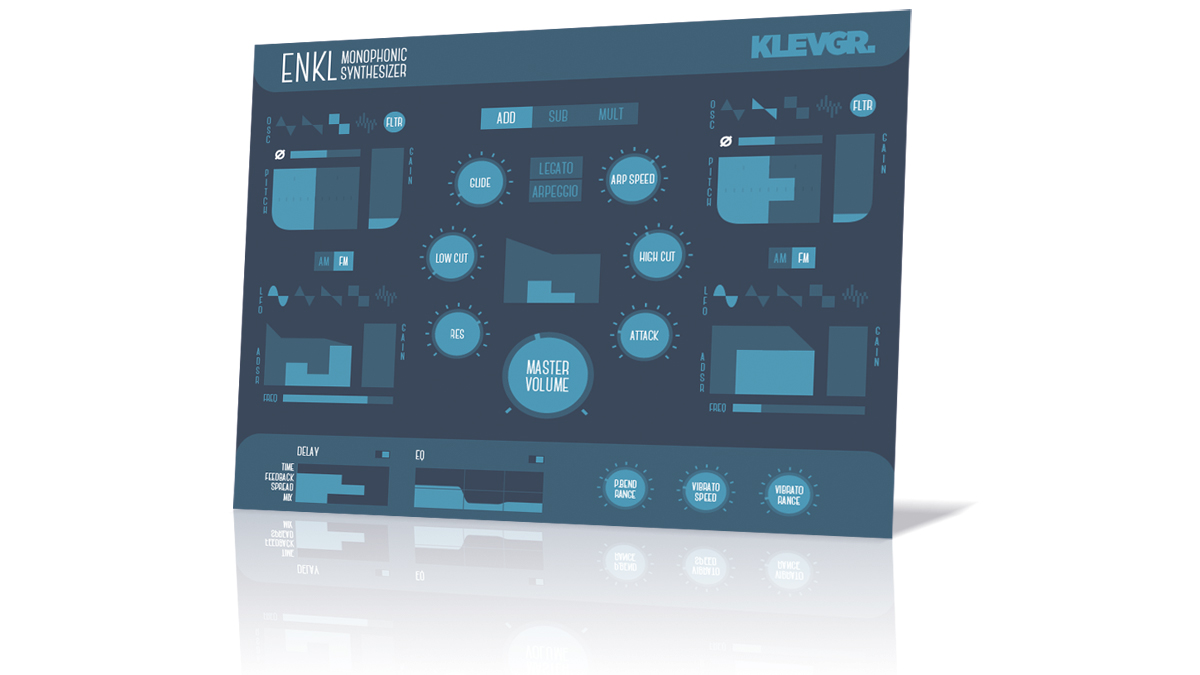MusicRadar Verdict
A simple yet sonically-pleasing synth, Enkl's sound, presets and price outweigh any minor functional drawbacks .
Pros
- +
Great sound. Easy on the wallet. Excellent presets. iPad version's keyboard can act as a MIDI controller.
Cons
- -
No host tempo sync. No numerical parameter values.
MusicRadar's got your back
Enkl is the Swedish word for 'simple', and Klevgränd's new monosynth is exactly that: simple in both name and intent.
However, we're not sure that Enkl should be considered an entry-level instrument, as a number of unusual design choices have been made that might well confuse the novice.
It has two oscillators with familiar analogue waveforms (triangle, sawtooth, square, noise) that can be added together, subtracted or multiplied. Adding the oscillators just means mixing them, and multiplying them performs ring modulation, while the subtraction mode essentially means phase-inverting one of the oscillators prior to mixing, most notably resulting in a phasing effect when using similar waveforms.
The oscillators can be sent straight to the output or to the filter section. Each oscillator has a dedicated LFO for amplitude or frequency modulation, and the LFO level can be modulated by a dedicated ADSR envelope.
The filter section offers low- and high-cut filters with shared resonance control. The high-cut filter features keyboard tracking, and interestingly, the speed at which the filter tracks to the next note can be controlled with the Attack function. Essentially, it's a glide time control for the filter keytracking.
One quirk of operation is that there's no numerical feedback to indicate a parameter's settings - you just have to eyeball it. That's fine most of the time, but it becomes troublesome when setting up, say, delay times, especially given that the delay doesn't sync to host tempo.
Arping on
Interestingly, the synth's main ADSR volume envelope isn't actually triggered with each new arpeggiated note; instead, the arpeggiator runs for as long as the notes are held (it doesn't latch) and the envelope comes later in the signal path, so with the Sustain set to zero, bringing the Decay too far down stops the arpeggiator before it can get going (unless the Arp Speed knob is cranked right up into chiptune territory).
Want all the hottest music and gear news, reviews, deals, features and more, direct to your inbox? Sign up here.
This is intentional, enabling the design of arpeggios that fade away according to the envelope's Decay value - something that not all synths are capable of. Annoyingly, however, the arpeggiator also lacks host synchronisation.
Enkl's preset designers have taken a broad approach, and although there are only 93 presets, they're almost all great, including some nice raw basses and a couple of terrific patches among the standard leads.
The variety of special effect sounds on offer is surprising, too, given the instrument's simplicity; these range from VCS-alike alarms to videogame hits. The kick drum sounds are the best of the lot, though - spiky and impactful.
What it might lack in features, Enkl clearly makes up for with the sheer quality of its sound and well-judged presets, not to mention that bargainous price (the iOS version is the better deal, we reckon).
If you're looking for a quirky, characterful addition to your arsenal that can be programmed in a jiffy, or just an affordable source of quality presets that you can call up and spin through whenever inspiration is short, Enkl deserves a look - and a listen.
Computer Music magazine is the world’s best selling publication dedicated solely to making great music with your Mac or PC computer. Each issue it brings its lucky readers the best in cutting-edge tutorials, need-to-know, expert software reviews and even all the tools you actually need to make great music today, courtesy of our legendary CM Plugin Suite.

